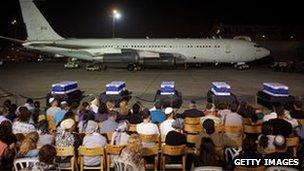Israel in mourning for Bulgaria bus bomb victims
- Published

Families of the dead attended a memorial service at Ben Gurion Airport
The photographs and life stories of the victims of the Bulgarian bus bombing carried in Israeli newspapers on Friday personalised for Israelis this latest attack, in a country no stranger to shootings and bombings against its citizens abroad.
One picture of Gilat and Yitzhak Kolangi wearing sunglasses and smiling shortly after their arrival at Burgas airport contrasts sharply with one of injured Natalie Menashe, weeping as she sits in her hospital gown in a wheelchair.
Four of the five who died - men in their twenties - were two sets of friends holidaying together.
Yitzhak Kolangi and Amir Menashe both left wives and small babies.
Two childhood friends from the northern Israeli city of Acre, Maor Harush and Elior Preis, were killed outright as they sat chatting on the backseat of the bus. A third friend is critically ill.
Yedioth Ahronoth reports on how "the most tragic day in the life of Itzik Shriki began as one of the happiest".
His wife, Kochava, 42, had just found out she was pregnant for the first time and had been breaking the news to her family. She was the only woman killed by the explosion.
The coffins of the dead arrived at Ben Gurion Airport in the early hours of Friday morning. Soldiers placed them before mourning family members on the airport tarmac where a solemn service was held.
Funerals have since taken place. Women shrieked and wept in grief as the body of Yitzhak Kolangi was brought into a synagogue in nearby Petah Tikva.
Threat warnings
Israelis have been shocked and horrified by this attack which targeted holiday-makers who had just arrived in Bulgaria on a charter flight.
However, as ministers pointed out, there have been other recent attacks or attempts to target Israeli citizens in a wide range of countries. They cite cases in Thailand, India, Georgia, Kenya and Cyprus.
As recently as January, a security official from Israel's Transportation Ministry warned of a threat in Bulgaria and identified buses as a weak spot in security.
It followed reports that a device had been found on a vehicle scheduled to transport young Israelis to a ski resort.
Bulgaria has become a popular destination for Israelis travelling on a budget in recent years.
"Israelis like Bulgaria because it's a cheap holiday. Burgas is also popular because it has a casino. That's a major reason," says Tali Teperberg, manager of Snir Travel in Jerusalem.
"We don't sell packages to Turkey any more. People stopped going for political reasons and it pushed the prices up because we're not a buying power any more. Other places like Greece are expensive this year."
She says it is hard to predict the impact of the attack on Bulgarian tourism from Israel.
"People were afraid after the attacks in India [in 2008] but Israelis still go there in thousands. In Kenya the attacks [in 2002] finished the market. The national airline stopped flying to Mombasa for security reasons and I never sold a ticket there again."
"My feeling is that Bulgaria will reach a dead end. Once they have to pay for more security it will be more expensive and the best reason for going there will disappear."
An Israeli woman who witnessed Wednesday's blast disagreed. Shoshi Eiler remained in Bulgaria with her family to take time to recover from the attack.
"About half the people on our flight decided to stay and half flew back. I think it was a good decision to stay. My son saw a lot of blood and the fire and if we flew straight home it would have been worse," she says.
"The Bulgarians have put policemen in every hotel with Israelis and are doing everything they can to make us feel safe. When I go shopping the people here keep saying they're sorry about what happened."
"I don't think what happened will stop Israelis coming here. Israelis are a target all over the world and nowadays there is terrorism all over the world."
- Published19 July 2012
- Published13 February 2012
- Published21 January 2012
- Published13 February 2012